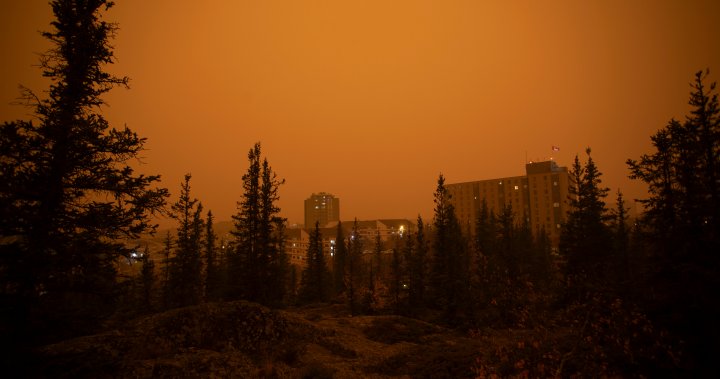Multiple communities in western Canada, including Fort Nelson, British Columbia, Fort McMurray, Alberta, and Cranberry Portage, Manitoba, issued emergency evacuation orders and alerts this weekend due to wildfires. The wildfires were more active than expected for this time of year, with thousands of residents being affected. In Fort Nelson, an out-of-control wildfire was burning just 3.5 kilometres west of the community, prompting an evacuation order for around 3,500 residents. The wildfire behaviour in northern B.C. was described as “pretty significant,” with officials urging residents to evacuate as the situation worsened. Despite reduced fire behaviour on Saturday due to factors like reduced wind speeds and cooler temperatures, the dry conditions meant that the situation could change rapidly. The Fort Nelson wildfire was estimated to be around 1,696 hectares.
In Alberta, similar fire behaviour was observed as firefighters battled strong winds to contain the flames. Evacuation orders in Fort McMurray and Saprae Creek were expanded to include several surrounding communities, with residents being on alert to leave at a moment’s notice. An evacuation order was also issued for Grand Prairie County No. 1 due to a wildfire burning about four kilometres east of Teepee Creek. Northern Manitoba also faced wildfires, with residents of Cranberry Portage being safely evacuated after an evacuation order was issued. Smoke from the wildfires caused reduced visibility and air quality issues in cities like Calgary, Edmonton, Saskatoon, and Winnipeg. Government officials warned of potential damage due to warm temperatures and drought, with Prime Minister Justin Trudeau emphasizing the need for better preparedness and coordination for wildfires this year.
The Regional Municipality of Wood Buffalo expanded its evacuation alert to include Fort McMurray, Anzac, Fort McMurray First Nation #468, Gregoire Lake Estates, and Rickards Landing Industrial Park. Residents were advised to be on alert to leave their homes at a moment’s notice due to the risk of wildfires. In Grand Prairie County No. 1, an evacuation order was issued for a wildfire burning east of Teepee Creek, with residents urged to follow evacuation orders for their safety and that of first responders. In Cranberry Portage, residents were safely evacuated after a wildfire jumped Highway 10, with emergency measures Coordinator for the RM of Kelsey, Lori Forbes, stating that residents were accommodated in hotels in The Pas and Swan River. However, due to limited space, efforts were being made to relocate some people further south.
Residents in affected communities shared their experiences of fear and anxiety as they were evacuated from their homes. Tina Colomb, a resident of the First Nations community Pukatawagan, recounted the panic and anxiety she felt upon seeing the out-of-control flames in Cranberry Portage, triggering memories of previous evacuations due to wildfires. Smoke from the wildfires not only affected residents’ physical health but also caused reduced visibility and air quality issues in several prairie cities. Meteorologist Rhythm Reet from the Weather Network emphasized the early and active nature of the wildfires this year, with concerns about the upcoming wildfire season. As Canada braces for a potentially severe forest fire season, officials are monitoring the situation closely to ensure the safety and well-being of all residents in affected areas.


